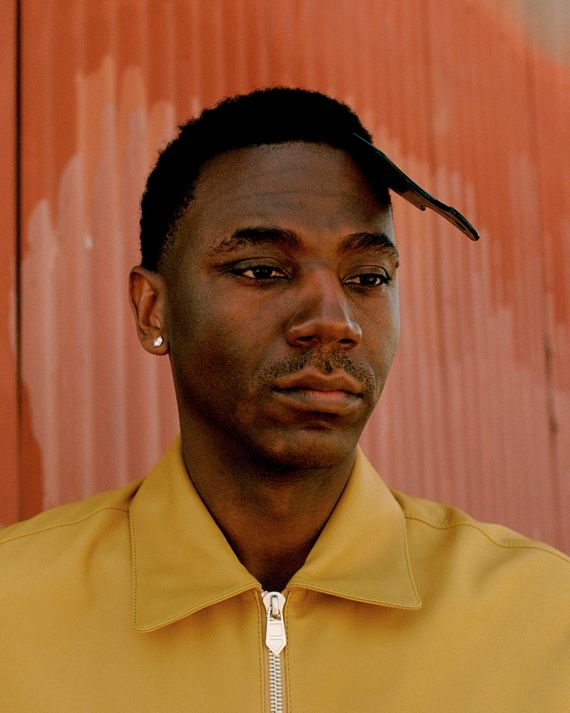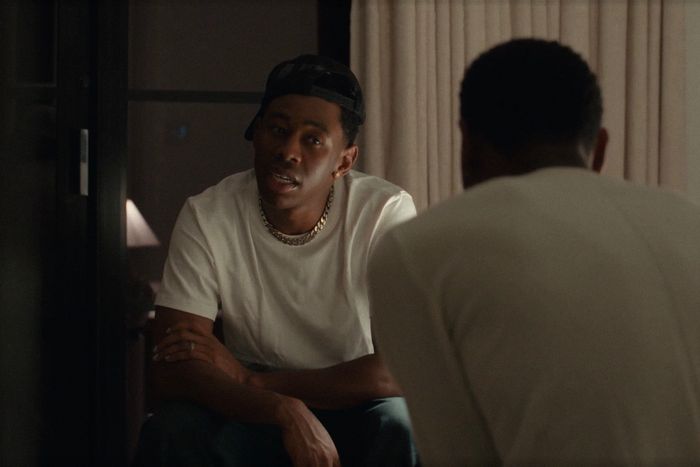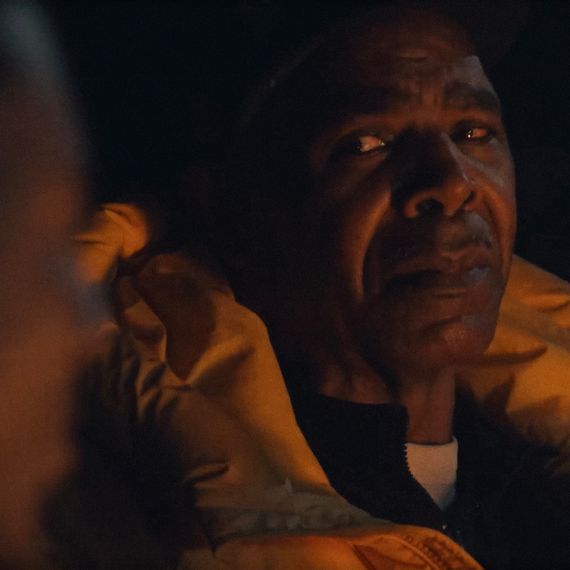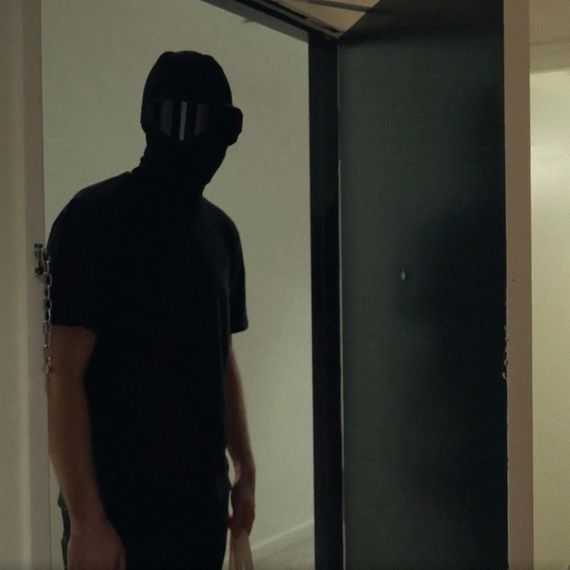
“It’s been a wild couple years,” Jerrod Carmichael says. We’re sitting outside the Four Seasons in downtown Austin, where his HBO series Jerrod Carmichael Reality Show will debut at South by Southwest later that evening. It’s a sort of follow-up to Carmichael’s Emmy-winning 2022 comedy special Rothaniel, in which he came out at age 35, only this new project takes his autobiography several steps further without really clarifying what’s organic and what’s a setup. Over eight episodes filmed between September 2022 and early 2024, he documents Grindr hookups, a budding romance, therapy sessions, interpersonal foibles, intense talks about his sexuality and family history with parents who would rather he keep both topics to himself, getting high and watching Phantom Thread, and other intimacies that border on exhibitionistic. In the first, an unnamed masked friend using a voice changer tells Carmichael that what he’s doing seems “masturbatorily public” and “self-destructive.”
It’s also funny and a little sad — sometimes simultaneously, like when Carmichael confesses his love for Tyler, the Creator and summons the rapper to his apartment to have an awkward conversation about it while the HBO crew watches. Carmichael finds difficult discussions easier with cameras nearby. (The series is directed by his friend and Carmichael Show co-creator Ari Katcher.) Where others would feel an urge to perform a certain version of themselves, he says he’s able to strip away the artifice that arises when cameras aren’t around. Is that healthy? He’s not sure. And he’s nervous about the responses the series will engender when it begins airing on March 29, especially among the people who appear in it. When we meet, he’s jotting thoughts in a notepad.
Was there something about the responses to Rothaniel that made you want to go further in revealing yourself to the public?
Even beyond that, coming out is crazy. I’ve reduced coming out to this: You have to tell your mom what kind of sex you’re into. Most people don’t have to. My brother just showed up with kids.
And nobody focuses on how those kids were produced.
It was the stork, it was a gift from God — all these euphemisms for how they get here. You don’t really have to have that conversation with your family. A lot of people don’t even have that deep of a conversation with their friends. Coming out has inspired me to have all types of deep and uncomfortable conversations. My boyfriend came out as a teenager. As a kid, to stand that firmly in who you are — I did not have the courage. I barely had the courage at 30. After coming out, two things happened. I regressed in many ways. I went through an adolescence as an adult, and I felt more courage in many ways because I had the hardest conversation of my life. I did the scariest thing that I thought I’d never do, so now I was curious about other scary things. The moments in life that made Rothaniel also inspired this.
Is what’s captured in the show those scary things?
Yeah. You asked me what I wrote down. I like to write my thoughts, especially about things I’m going to do. The thing I just scribbled was, “It feels like you’ve read my diary and I’m afraid to give a recital, and I’m only doing this because I was told HBO would be happy.” You seem kind, and I’m very thankful that you would take the time, but —
You would rather not be doing this interview.
For sure.
I get that.
There’s something even about the marketing of it all that’s been tough to deal with. The show is so honest, so then trying to give correct answers for this thing that is just my life is hard. The production didn’t feel formal in that way. I was literally waking up with cameras in my face sometimes, or just opening the door to a camera.
Tell me about the logistics of that. When you started shooting, what did you specify to Ari and the camera crew that you did and didn’t want captured?
Nothing with me was off-limits. I was trying to be respectful of the people who were in the show because I can offer all of myself, but I can’t do that for others. I can only focus on my relationship with them and things that I have ownership over. A lot of reality shows are people who just met for the sake of the show, these contrived situations. Arguing with somebody you met a couple of weeks ago is different than having an intense conversation with my parents or exposing certain aspects of my relationship with my boyfriend and toeing the line between truth and being respectful. I don’t know how much of it is immoral.
You do, at one point, have an anonymous white man telling you that what you’re doing isn’t the truth, that it’s going to be edited and constructed through somebody’s lens.
Yeah, and I tried to stay away from the process. I wasn’t in the editing room because if I’m going to give myself over, I can’t be precious. I think the show made me ask a lot of questions about what is true — not just on the show, but also in life. How much of my life is a performance? Can the cameras see past that? My worst performances as an actor are me trying to be cool on-camera. They captured me being uncool because I was trying to be cool. It can see past the performance, and that is never good.
I’m definitely heavily critical of myself in Poor Things. This sounds like an excuse, but my relationship to cameras has changed a lot since I filmed that in 2021. That was before my last special. Even with my own shows, I’m just so different on-camera than what I was at that time.
In what way?
I’m less afraid of them and less aware of them. I’ve accepted cameras for the lie-detector test that they are. I’ve relinquished the need for control when there’s a lens nearby. The last special was really an exercise in letting go and really showing myself on-camera.
Was that tall anonymous man Bo Burnham?
Anonymous is anonymous. Anonymous is a friend. That’s all I’ll say about it.
When you are having these intense conversations with your mother or father, does it feel to you like a performance because the cameras are around?
That’s what I mean about the blurred line. Christmas with them without a camera feels like more of a performance than what’s in the show. Thanksgiving is a performance. That’s me being the good son.
So the camera is liberating.
It’s reason not to perform. With the cameras, it’s where I perform the least.
It unshackles you from being “on” the way you feel you have to be at Christmas.
Yes. The conversations you see on the show are an excuse to say what I really want to say. Over turkey is not necessarily the right moment.
Would you have had those conversations without this show?
I don’t think so. I don’t think I was brave enough. It’s just never the right time. I avoid it. If someone texts me “we need to talk,” I’ll never speak to them again. It could be devastating. You should have told me in that text. How dare you?



There’s a moment around the campfire when your dad indicates that he does not want to have a conversation about your sexuality, and also his past infidelities, on-camera. Did including it anyway ever give you pause?
I just don’t know why I would hide it. He has every right to shut down and not say anything, and that would make things no different than real life. But even before the show, the deepest conversation I ever had with my father was when I made this documentary called Sermon on the Mount. I was terrified of that conversation. In fact, I had a conversation with my mom in Home Videos, the documentary I made before that. I asked him to leave the house, but he wanted to know what was said. My brother had to drag him out of the house to get him away. Why? It’s because we were going to have as truthful a conversation as we’d ever had. At that point, that was as honest as I knew how to be. I half came out in a cowardly way. I know my parents think some of these things are better left unsaid — that’s how the generation before mine dealt with things, by not dealing with them. And I’m certain there’s a healthier way than ambushing your family with cameras, but I don’t think having the conversation is the least healthy thing. A lot of the show has brought me to a place of closure and peace. It’s definitely challenged all my relationships, but I think it was worth it. Part of what’s difficult even talking about it now is that I’m still in it. I’m still getting calls and text messages with questions about what’s in it, people who are angry about things that are in it, people who are afraid about how they’re perceived. I’m dealing with that in real time. If we were doing this interview a year from now, I’d be able to reflect on it.
Who is angry?
Everybody. Everybody’s either angry or concerned, because obviously you only look for yourself in it. There was a quote from the Ronan Farrow New Yorker RuPaul interview that I sent to my boyfriend. He said, “We’ve had kids come on Drag Race, and we put a camera on them, which can be like a mirror, and they see the reflection of themselves and go, ‘Oh, no, that is not who I am. They must have done something to make me look like that.’ … No, we don’t do that.” The difference is these aren’t just people in a competition. Nobody wanted to do it. I wanted them to do it, so people are doing it for the love of me. Unfortunately, what makes it a good show is the reluctance.
What was it like to get Tyler to participate?
It was difficult. You see it in the show. It was, “Hey, I want to have a conversation with you on-camera.” “Why?” “Well, it’s something I find hard to talk to you about not on-camera.” People do it out of respect for me, but it’s hard. My dad said no. My brother had to fly with him to New York to get him on the plane to do it.
Where does your relationship with Tyler stand now?
I’m thankful that he did it. He’s a friend. That’s pretty much it. Even in my own relationship — I’m thankful that my boyfriend is in the show. He’s such a private person, and I was asking for a lot.
And you’re becoming increasingly less private. Coming out in a comedy special one year and filming yourself hooking up with boys the next is a pretty big graduation.
Is that graduating?
Regressing? I know you said it’s like a second adolescence.
Yeah, and this is what my life looks like day-to-day. I asked my friend Lionel Boyce, who’s in The Bear, if he recognizes me in the show. I share everything in my life with him. He knows things we didn’t even have room to get into on the show. He’s someone I completely trust. I sent it to him, and he said, “This is exactly what you be doing all day.” I think anyone who allows this much access is complex. It’s a scary thing to do.
By “graduation,” I mean another level of exposing yourself. When production was around and you would initiate a hookup, did you tell the guys, “When you come here, there will be cameras”?
Yeah, you give a heads-up. It’s surprising how many people are down. I mean, we are in the era of OnlyFans and Twitter.
But most of those people don’t end up on HBO.
But, you know, what’s the difference? It’s all just different corners of the internet. But I guess everything is more complex than I’m making it out to be, because on Grindr you can hook up with somebody and not know their name. Now, I’m like, “Hi, I’m Jerrod. This is a thing I’m filming for HBO.” It’s easy to perform a piece of myself in hookups. Even the sex itself is in some ways a performance of porn or something. It’s very strange. I’ve performed so much in my life — every aspect, every relationship — and these cameras have given me a break from the constant show.
Now that you have done that, where do your creative interests lie?
Stand-up’s been very interesting — to be able to have a conversation with the audience. It’s actually more personal than it’s ever been, and funnier because it’s personal. I’ve never been someone who considered themselves to even have an audience. I’ve always thought I was resetting with every show. Like, you don’t know a thing about me and I have to explain. Even while making Rothaniel, I was coming out like, This person you’re meeting for the first time has something to tell you. Now, audiences are more familiar with me, and I’m getting used to that. There’s something very fun in that that’s allowed the shows to go deeper.
Are you interested in dipping back into fiction?
Nonfiction has always had my attention. Right now I’m watching The Sopranos, and me and my boyfriend get into arguments about certain things because I’ll go, “Oh, it’s a documentary.” I call things I really love a documentary. I think Phantom Thread is a documentary. Daniel Day-Lewis treats it as such: He becomes the person in order to document them. So watching The Sopranos, I’m like, Man, this is so real. The crumbs on Tony’s shirt — it’s all so textured. I’m at the season where Steve Buscemi comes in, and I love Steve Buscemi. I’m hoping his character gets offed because it’s taking me out of it. I see this star, like, Why is Steve Buscemi in this documentary? Get back to the doc. Even with the things that I’ve written, I’ve always been interested in playing with the tension of reality. I love things that feel internal and honest. I have a few things lined up that I’m collaborating with some people on, but who cares until it’s out?
Right now, you have a long wave to ride with this show rolling out.
Yeah, I gotta deal with that every Friday for eight weeks.

